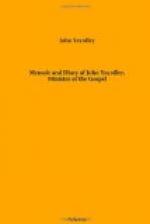1825-6.
The time was now come for John Yeardley and Martha Savory to pursue their journey to the Rhine, Switzerland and France. They left Pyrmont on the 11th of the Tenth Month, 1825, and beside Martha Towell, were accompanied as far as Basle by William Seebohm as interpreter. Every member of the party wrote in one way or other an account of the journey, and we have availed ourselves of these various sources in the following narrative.
Passing through Paderborn, they arrived at Herdecke on the 13th. Regarding his feelings in this place John Yeardley writes:—
This morning I was greatly dejected, and fearful we might find none of the people whom we were seeking. As I was walking pensively outside the town, I recollected what I once read in “Cecil’s Remains,”—that a way may suddenly open before us when we the least expect it. This was now to be verified; for after we had entered the carriage with the intention of going to Elberfeld, and while we were waiting for a road-ticket, I accidentally fell into conversation with our hostess, and making inquiry for people of religions character, learnt that there were a number of such in the neighborhood.
The Friends alighted, and sent for a member of this little society who resided in the town. He informed them that a meeting was held at Hageney, about six miles distant, at the house of a pastor named Huecker. Being disposed to visit this pastor, they took their informant with them as guide, turned their horses in the direction opposite to Elberfeld, and drove along a very bad road to his house. They found him occupied in teaching some poor children. He told them that their visit was opportune and remarkable, for that he had been denounced as a delinquent before the Synod of Berlin, which had sent him a string of questions on doctrine and church-government. He had returned a reply to the questions, and was then waiting the determination of the synod, whether he was to be displaced from his cure or not. The Friends examined his answers, and were well satisfied with them: the worship which he and his little flock (about thirty in number) practised was of a more spiritual character than that of the national church. Martha Savory expressed her deep sympathy with him in his difficult and painful situation, and John Yeardley also addressed him in words of consolation and encouragement.
At Elberfeld, where they arrived on the 15th, they met with several interesting persons. One of these, a young pastor named Ball, became greatly endeared to them. He informed them that when he had been severely tempted, he had found support and deliverance in silent waiting on the Lord. Another was Pastor Lindel, who resided at some distance from the city, in the Wupperthal; he had been brought up a Roman Catholic, had seen many changes, and suffered not a little persecution. He took them to see a neighbor, an aged man, weak in body, but strong and lively in spirit. This




